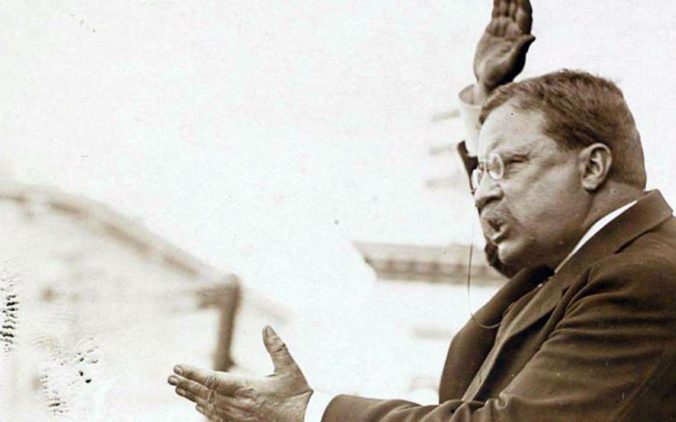Theodore Roosevelt was never a particularly restful soul. After he left the presidency, and then failed to reattain the White House running as a member of the self-created Progressive Party in 1912, Teddy wished to remain an active voice in politics. Between September 1917 and his death in 1919, Roosevelt penned a column which regularly appeared in The Kansas City Star, a newspaper which is still in circulation today.
Roosevelt’s columns were collected in a pair of books which were published a few years after his death. Volume I and Volume II can be downloaded from the Internet Archive.
I have broken from my usual analysis of the Democratic presidential primary and the 2020 Senate elections to publish a particular article of Roosevelt’s which has become particularly famous, so much so it has its own Snopes citation. I’ve had cause to refer to this article a half dozen times over the past ten years or so, and despite the passage of time, it has remained frustratingly difficult to track down more than a quotation from it, so I am presenting it here for future reference. There is some variation in paragraph breaks between one version and the next. I have opted for the shorter paragraph breaks found in this version.
“Sedition, A Free Press, and Personal Rule” – The Kansas City Star, May 7, 1918
The legislation now being enacted by Congress should deal drastically with sedition. It should also guarantee the right of the press and people to speak the truth freely of all their public servants, including the President, and to criticize them in the severest terms of truth whenever they come short in their public duty. Finally, Congress should grant the Executive the amplest powers to act as an executive and should hold him to stern accountability for failure so to act, but it should itself do the actual lawmaking and should clearly define the lines and limits of action and should retain and use the fullest powers of investigation into and supervision over such action.
Sedition is a form of treason. It is an offense against the country, not against the President. At this time to oppose the draft or sending our armies to Europe, to uphold Germany, to attack our allies, to oppose raising the money necessary to carry on the war are at least forms of sedition, while to act as a German spy or to encourage German spies to use money or intrigue in the corrupt service of Germany, to tamper with our war manufactures and to encourage our soldiers to desert or to fail in their duty, and all similar actions are forms of undoubtedly illegal sedition. For some of these offenses death should be summarily inflicted. For all the punishment should be severe.
The Administration has been gravely remiss in dealing with such acts.
Free speech, exercised both individually and through a free press, is a necessity in any country where the people are themselves free. Our Government is the servant of the people, whereas in Germany it is the master of the people. This is because the American people are free and the German are not free. The President is merely the most important among a large number of public servants. He should be supported or opposed exactly to the degree which is warranted by his good conduct or bad conduct, his efficiency or inefficiency in rendering loyal, able, and disinterested service to the Nation as a whole. Therefore it is absolutely necessary that there should be full liberty to tell the truth about his acts, and this means that it is exactly necessary to blame him when he does wrong as to praise him when he does right. Any other attitude in an American citizen is both base and servile. To announce that there must be no criticism of the President, or that we are to stand by the President, right or wrong, is not only unpatriotic and servile, but is morally treasonable to the American public. Nothing but the truth should be spoken about him or any one else. But it is even more important to tell the truth, pleasant or unpleasant, about him than about any one else.
During the last year the Administration has shown itself anxious to punish the newspapers which uphold the war, but which told the truth about the Administration s failure to conduct the war efficiently, whereas it has failed to proceed against various powerful newspapers which opposed the war or attacked our allies or directly or indirectly aided Germany against this country, as these papers up held the Administration and defended the inefficiency. Therefore, no additional power should be given the Administration to deal with papers for criticizing the Administration. And, moreover, Congress should closely scrutinize the way the Postmaster General and Attorney General have already exercised discrimination between the papers they prosecuted and the papers they failed to prosecute.
Congress should give the President full power for efficient executive action. It should not abrogate its own power. It should define how he is to reorganize the Administration. It should say how large an army we are to have and not leave the decision to the amiable Secretary of War, who has for two years shown such inefficiency. It should declare for an army of five million men and inform the Secretary that it would give him more the minute he asks for more.
